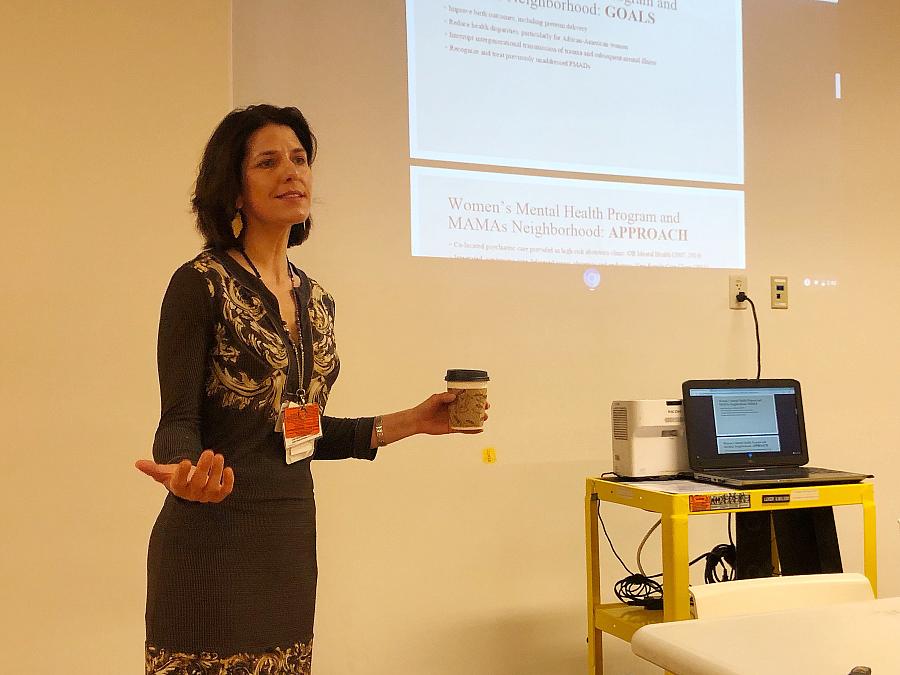New approaches help women suffering from maternal depression and domestic violence in L.A.'s safety net

Dr. Emily Dossett, a reproductive psychiatrist who directs the Women’s Mental Health Program at LAC+USC.
(Photo by Lauren Whaley for CHJ)
Domestic violence survivors are more likely to have unintended pregnancies and poor pregnancy outcomes. They’re six times more likely to become dependent on drugs and twice as likely to have long-term health problems, such as asthma or diabetes.
That’s what experts at the LAC+USC Medical Center told the 2019 California Fellows this week, who visited the Wellness Center to learn about new programs in the Los Angeles safety net to bolster maternal mental health and address domestic violence.
Dr. Emily Dossett, a reproductive psychiatrist who founded and directs the Women’s Mental Health Program at LAC+USC, said that about a quarter of women experience depressed moods during pregnancy in Los Angeles County. For black women, the rate is higher: 35.8 percent reported a depressed mood in pregnancy, compared to 18.5 percent of white women and 27.5 percent of Latina women, according to a county-wide survey.
Dossett screens women for maternal mood disorders from when they first start receiving prenatal care in the OB-GYN clinic through their pediatric appointments when they bring their children in for well-baby visits. Her typical client has multiple medical, psychiatric and social needs. “Many of these women don’t have anybody to talk to,” said Dossett. “They’re holding it all together for other people.”
Fellows also heard about how survivors of domestic abuse and sexual assault are three times more likely to have mental health conditions.
That’s why Dossett collaborates with the East Los Angeles Women’s Center, founded in 1976 by volunteers. Today, the center works to connect survivors of domestic violence and sexual assault — especially in local Latino communities — to resources such as crisis support, therapists, lawyers, housing, self-defense classes and other services.
Rebeca Melendez, director of services for East Los Angeles Women's Center's office at the medical center, told the fellows that from 2015 through 2018, advocates from the center went out 717 times to assist survivors of sexual assault or domestic violence. The center logged 890 first-time therapy visits and 2,181 clients seen during that same period, she said.
And just last year, the center opened an on-site shelter for sexual assault and domestic violence survivors called Hope and Heart Women and Children Shelter.
“The shelter is the first of its kind in the nation,” said Melendez. “There has never been a domestic violence or sexual assault shelter on a medical campus ever.”
She described a mother who came in pregnant and left as a family of three after giving birth to twins. She said another mother with a baby in the nearby NICU stayed at the shelter and was able to visit her baby next store. Both women were victims of domestic violence.
The location of the shelter and the center on hospital grounds also allows doctors to have an on-site resource for their patients, which increases the likelihood that they’ll ask their patients about what’s going on at home.
“‘I can’t even address her diabetes because of what’s going on at home,’” Melendez recalled one doctor saying.
The center also provides training for doctors on how to refer patients to the right services and resources in the short amount of time they have with each patient.
Melendez said survivors are more likely to confide in a doctor than a social worker, police officer or teacher. Most patients prefer that their health care providers ask them privately about intimate partner violence, according to Melendez.
Melendez credits the Me Too movement and social media with growing awareness of intimate partner violence, which impacts about one in four women in the U.S.
As many women also experienced symptoms of depression during pregnancy. Dossett, the reproductive psychiatrist, said maternal mood disorders are the most common complication of pregnancy, and suicide is one of the leading causes of death among pregnant and postpartum women.
Awareness of maternal mortality and mental health has increased in recent years, thanks in part to reporting from ProPublica and personal accounts of celebrities such as Serena Williams and Beyoncé.
Additionally, the U.S. Preventive Services Task Force recently updated its recommendation that doctors screen pregnant and new moms to identify those most at risk of becoming depressed. Former California Gov. Jerry Brown signed into law late last year two pieces of legislation that will help pregnant and new mothers get help for maternal mood disorders.
And just this week, the Food and Drug Administration on Tuesday approved brexanolone, the first drug specifically targeted to treat postpartum depression.

